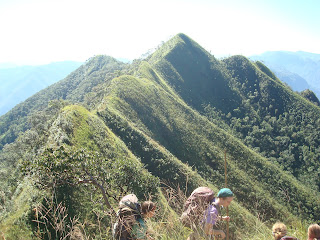less color, more gravity
how absurdly unfortunate
we live up here, with such relative lack and surplus
of these most pivotal phenomena
an inversion of such
proves both wildly inhospitable and miraculously stunning






fresh off the boat, i return to chiang mai for a final 48 hours. the last 3 weeks have been on a little archipelago 70 km off the coast of southern thailand near malaysia. The first half consisted of camping on the beach and kayaking between snorkeling sites - mooray eels, puffer and porcupine fish, sting rays, coral beds, sea snakes, anenome, starfish, urchins, nemo. Its quite a world down there, an intricate scaffold of coral filled with tiny zoozanthellae photosynthesizing at the lowest trophic level, followed up the latter by a diverse array of creatures who have their own coral reef niche. Amazing colors, absurd co-evolutionary adaptation, a place still hunted and gathered - the last true wildlife on earth the oceans are.
But its not all fun and games... the ocean acts like an absorbtive sponge respirating into and out of the atmosphere that we fill with CO2 among other things. The ocean absorbs the vast majority of our
carbon emissions - and is becoming less and less saturated with calcium carbonate as a result. This will cause problems for creatures that form shells and corals that cement calcium carbonate. Ocean acidification is really happening and will continue to occur into the future. Rising sea level temperature causes corals to release their symbiotic zoozanthellae friends causing bleaching. Unabated, life will still exist in the oceans, just not as we know it. Jellyfish may take over the world. But we could start eating them. They could be delicious hor'de'vores for future climate summits like in Copenhagen.
The Urak Lawoi people (people of the sea) have inhabited Koh Lipe, an island in the Adang Archipelago for almost a century. They traditionally relied on the reef for subsistence but have now turned to the tourist industry and small scale commercial fishing in the offseason. Things are not looking good for the local people - they are selling off or being pushed off their land by resorts, trash is piling up on the island, sewage is seeping into the groundwater threatening to leech into the reef causing an algal overgrowth, and the fishing isn't so good. Predator populations like the king mackeral and tuna are being overfished by both the Urak Lawoi and the huge Thai and Malaysian trawlers who pay the vastly underpaid national park officials to illegally fish within the park.
Darwin used the island ecosystem as a microcosm for a larger more complex ecosystem. We did the same with the situation on Koh Lipe. The island could foreshadow the island landmass of earth, also surrounded by ocean. The tragedy of the commons in full effect. Individual benefit of exploitation outweighs the collectively shared degredation. Individual altruism won't solve the problem - collective organization is needed but near impossible with the vast array of stakeholders on the island. Local people, national park, commercial trawlers, tourists, investors from the mainland, resorts, etc. The human being is only adapted to conceptualize at most maybe an 100 year time frame. Future generations have no vote. I personally was slightly upset with the past few generations... because of their treatment of the area sea turtles, dugongs (manatee like), sharks, big old fish - mainstays of a healthy coral reef, were missing. If development on Koh Lipe continues and commercial fishing keeps up the local people have no future in the area.
I am officially finished with half of my junior year!... now that I've returned from the beach island resorts, vacation is finally upon me. To the hinterlands I will go. Me and two accomplices are headed to Cambodia for a whirlwind 2 week odyssey. Merry new year, happy christmases, good solid kawanzas and belated joyous hannukahs, vuluptuous solstice moon times, live long and prosper my friends.... Odd days are upon us!













































